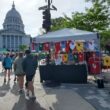INSIDE WASHINGTON/Local officials move to national stage
There is only one certain outcome when voters of Georgia’s 3rd Congressional District choose a new congressman next month: They will send a local official to Washington to represent their interests on Capitol Hill. Bibb County Commissioner Calder Clay (R) is squaring off against former Macon Mayor Jim Marshall (D) for the open congressional seat in South Georgia, and the race is viewed by both Democrats and Republicans as crucial to control of the House majority.
Calder and Marshall are just two of more than 25 current and former local officials who have sought election to Congress this year. Some of the candidates already have lost in the primaries, while others await their fate at the November polls.
Elections for the U.S. House of Representatives include the high-profile race between Palm Beach County (Fla.) Commissioner Carol Roberts (D) and incumbent Clay Shaw (R). Roberts is best known for demanding a recount of disputed ballots in her county during the 2000 presidential campaign.
In the Senate, both parties are following races in Minnesota and Texas, where former mayors are engaged in close contests. Former St. Paul Mayor Norm Coleman (R) is trying to unseat Paul Wellstone (D), while former Dallas Mayor Ron Kirk (D) is battling Texas Attorney General Jon Cornyn (R) to succeed the retiring Phil Gramm (R). Republican and Democratic leaders believe those races are crucial to controlling the Senate in the 108th Congress.
Local officials who run for national office can face special challenges. For example, unlike candidates with private sector backgrounds, local government veterans have to answer to political records they established in office.
“This sure can be a double-edged sword,” says Stuart Rothenberg, publisher of the Rothenberg Political Report and a columnist for Washington, D.C.-based Roll Call. “Their record allows them to point to the accomplishments and successes, but it also gives opponents a target to shoot at.”
“You [have] issues that can backfire on you whether it is a school strike or a snowstorm where the streets don’t get plowed,” says Sen. Lincoln Chafee (R), the former mayor of Warwick, R.I.
For some local officials, running for national office while holding local office creates heightened expectations in their communities. Lou Barletta (R), mayor of Hazleton, Pa., learned that during this year’s bid for Congress.
In August, a local priest urged parishioners to call Barletta (who is challenging Rep. Paul Kanjorski (D)), urging him to correct a flooding problem in the church. “The mayor is running for Congress, and he wants your vote,” Barletta says the priest told his flock. “The next thing I knew, my phone was ringing off the hook from parishioners.”
Local officials currently running for Congress will — if elected — be greeted on Capitol Hill by approximately 120 legislators who once served in local elected office. The more, the better, says Sen. George Voinovich (R), former mayor of Cleveland.
According to the senator, the federal government needs more people who understand the impact of federal decision-making on local and state governments. “We have a lot of people — Republicans and Democrats — that have no appreciation for state government, county government, municipal government or town-ships,” Voinovich says. Pointing to the Capitol, he adds, “They think the sun comes up and sets on this building.” With local experience, legislators can promote a shift in that focus.
The author is Washington correspondent for American City & County.



















